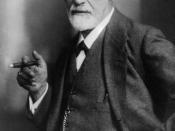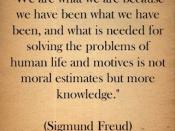Sex and Gender seem to have two connotative meanings in society today. Sex is a very scientific term that explains the physical attributes of a person and the sexual organs they possess, where as gender is defined as the overt expression of attitudes that indicate to others the degree of your maleness or femaleness; "your gender role is the public expression of your gender identity"
Both Psychoanalysis and Behaviourism have view on how we develop our gender roles
Psychoanalysis was first developed by Sigmund Freud in the 1950's. He based his theory on the case studies on five middle class "mad" women, and because of these limited methods Freud's theory has been highly criticised for not being representative, for being too over generalised and also as he was developing this theory in the 1800's it was been commented that it is outdated and no longer relevant to modern society. Even with all this criticism psychoanalysis has been a very good basis for many therapies still used today.
There is no scientific proof to support Freud's theory. Freud was one of the first psychologists to demonstrate a link between our minds and physical illness, he was also the first to highlight the importance of our childhood and its development.
Freud believed that though our childhood development, we pass through 5 psychosexual stages. At each of these stages out Libido (pleasure drive) will be concentrated on one particular part of our bodies and order to progress to the next stage we must first gratify the libido.
The 5 psychosexual stages start at birth, between the age of 0 and 18 months a child will enter the oral stage where gratification can be obtained my the mouth eg. Sucking, eating.
At around 18 months children usually enter the anal stage where they can get...


